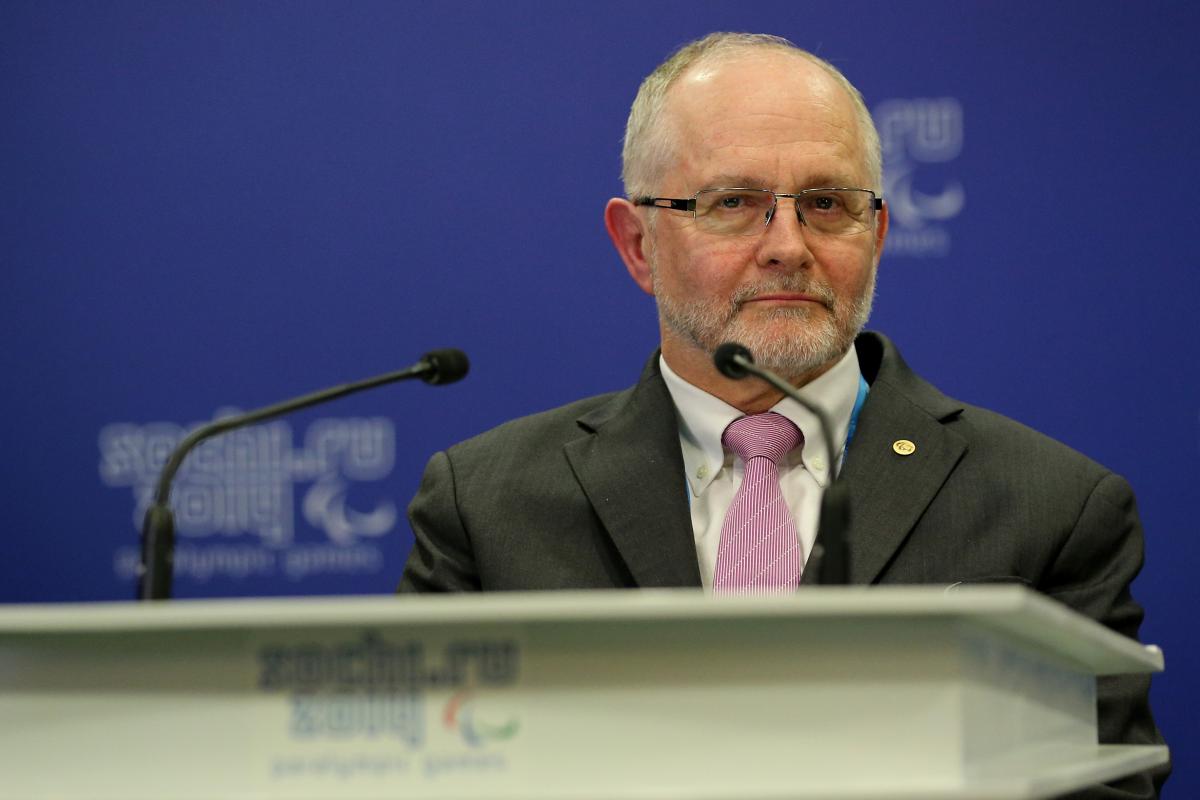IPC President: “Paralympic Games are greatest showcase on earth"
To mark the International Day of Persons with Disabilities, IPC President blogs about why he thinks the Paralympic Games are the world’s number one sporting event for driving social inclusion. 03 Dec 2015
Sir Philip Craven the President of the International Paralympic Committee speaks to the International Paralympic Committee Governing Board prior to the Opening Ceremony of the Sochi 2014 Paralympic Winter Games.
“Paralympians don’t have time to worry about what doesn’t work, they just maximise what does.”
Donna Ritchie
Sydney 2000 Paralympic silver medallist in wheelchair basketball
The United Nations Day of Persons with Disabilities (IDPD) has been commemorated annually on 3 December since 1992, to promote awareness and mobilise support for critical issues relating to the inclusion of persons with disabilities in society and development.
This year’s theme is “inclusion matters: access and empowerment for people of all abilities”.
At the International Paralympic Committee (IPC) we aspire to make for a more inclusive society for people with an impairment through para-sport and, in my view, the Paralympic Games are the greatest showcase on earth of inclusion and empowerment in action.
Next year’s Rio 2016 Games will once again highlight the fantastic abilities of the world’s best para-athletes and cement the Paralympics’ position as the world’s number one sporting event for driving social inclusion.
Since the first edition, in Rome, Italy, in 1960, the Paralympic Games have continued to grow in size and scale. London 2012 attracted a record 2.8 million spectators, whilst a cumulative television audience of 3.8 billion watched in more than 100 countries. Next year’s Games in Rio will be even bigger with more athletes, countries, sports, spectators, media and broadcasters than ever before.
All these figures are relatively small however compared to the impact the Paralympic Games have on society. Research post London 2012 found that one in three British people – equivalent to 20 million people – changed their attitudes towards people with an impairment as a result of the Games. A further eight out of 10 (81 per cent) felt the Paralympics had a positive impact on the way people with an impairment are viewed by the British public.
The trigger for these seismic shifts in attitudes was the performances of the para-athletes; 4,237 from 164 countries took part and what they delivered in 20 sports helped showcase to the world what can be achieved when testing your body to its absolute limits. Due to the outstanding performances, the public’s focus switched from an athlete’s perceived disability to their wonderful talents.
The Paralympics Games empower millions around the world and many of the young athletes who will line-up in Rio next year will do so because they were empowered to take-up sport after watching the performances of Paralympians at London 2012.
Rio 2016 is a huge opportunity for the whole Paralympic Movement. I am confident that Latin America’s first Paralympic Games, which are set to be broadcast to a cumulative television audience in excess of four billion for the first time, will have more impact than ever before. The Games will highlight to the whole world exactly why inclusion matters.
Acting as a catalyst to inclusivity and accessibility
One the sub-themes of IDPD 2015 is making cities inclusive and accessible for all. Over the years, the Paralympics have developed a track record for transforming the host cities of the Games, with the two best most recent examples being Beijing 2008 and Sochi 2014.
In the seven years leading up to the Beijing 2008 Paralympic Games, the Chinese government spent RMB 1 billion – equivalent to EUR 124 million and the sum of the last 20 years’ investment – making 14,000 facilities, including roads, transport hubs and public buildings, accessible throughout China.
More than RMB 67 million was spent making 60 of the country’s most popular tourist destinations – including the Great Wall of China and 600-year-old Forbidden City – accessible.
It is likely none of these changes would have happened had it not been for China winning the right to stage the Paralympic Games. We witnessed similar changes in Sochi, as Russia prepared to stage its first Paralympic Winter Games in 2014.
As a result of Sochi 2014, new legislation was passed at the highest levels of government and the Organising Committee created a barrier-free infrastructure, ensuring that everything built for the Games was accessible for all.
Sochi is now a blueprint for the rest of Russia, with 200 cities already using what was created for the Games as a guide for furthering their own accessibility.
We’re also seeing some progress in Rio ahead of next year’s Paralympics.
Due to its natural and spectacular topography Rio can be difficult to get around, but I am pleased that the Rio city government are taking steps to help change this.
Ahead of the Games, Projecto Rotas Acessiveis (Accessibile Routes Project) will see EUR 1 million spent improving the accessibility at 10 popular Rio tourist destinations. In the grand scheme of the city, this maybe only a small step, but I hope it acts as the catalyst for further changes.
With estimates suggesting that by 2050, 66 per cent of the world’s population will be living in cities, it is vital that inclusivity and accessibility is at the heart of the design process for new buildings and infrastructure.
The IPC will continue to work with host cities of future editions of the Paralympic Games to ensure accessibility is a top priority. At the end of the day accessibility does not just benefit people with an impairment, but also parents with pushchairs, the elderly and many, many more. In other words – all people at some stage in their lives!
We want the cities to be accessible and inclusive for all.
Sir Philip Craven MBE
IPC President




